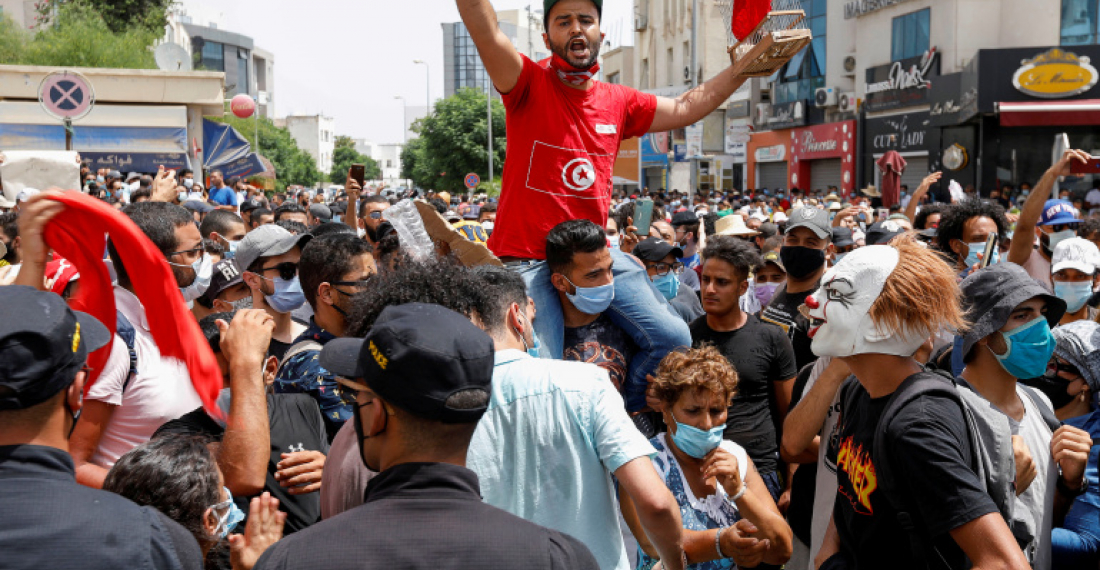After a day of clashes in front of Tunisia's army-barricaded parliament on Monday (26 July), the situation in Tunis has calmed down. Following President Kaïs Saïed's move to "freeze" the parliament's activities for 30 days and dismiss his prime minister, Hichem Mechichi, on Sunday, the latter said he was ready to hand responsibility to whomever the president chooses as his new premier.
The president took these decisions at a time when the country is hit hard by an economic and social crisis accentuated by the Covid-19 pandemic. Anger arose amongst the main party in parliament, Ennahda, who supports Mechichi and denounced on Monday "a coup against the Revolution and the Constitution".
On Tuesday (27 July), following a meeting held the night before, Ennahda said in a press release that it was ready "for the holding of simultaneous legislative and presidential elections to guarantee the protection of the democratic process, in order to avoid that any delay does not serve as pretext for the maintenance of an autocratic mode". The Islamist party nonetheless continues to denounce “a coup against the Constitution and the institutions".
Ennahda declined to call for protests, asking instead for its supporters to stay home to avoid any violence following Monday's street clashes. In a similarly pacifist manner, the party called for national dialogue to get the country out of the political, social, economic and health crisis.
"We have decided to campaign peacefully to defeat this project (of President Saïed) and we call on the president to reverse this decision," Noureddine B'Hiri, a leader of the Ennahda party, told Agence France-Presse (AFP).
Ennahda's desire to avoid any escalation is shared by the international community, which has urged the Tunisian executive to restore the stability and functioning of the country's democratic institutions as soon as possible.
Indeed, several countries have voiced their concern, not only regarding the fragility of Tunisia's democracy, but also in regards to the socio-economic consequences of the current situation. For instance, Italy – one of the main "gateways" to Europe for migrants, especially from the African continent – fears that the protracted crises in Tunisia may result in a drastic increase in migrants arriving from Tunisia. Italian authorities believe numbers could potentially reach up to 15,000 by the end of the year.
According to a source in the Italian Interior Ministry, “the political turmoil could exacerbate the economic crisis in Tunisia, which is already severe due to the impact of the pandemic". In an attempt to avoid such a situation from unfolding, Italian Foreign Minister Luigi Di Maio immediately called on the EU Commission for help, asking for increased co-operation with Tunisia to solve the local economic crisis and discourage the departure of migrants. Like his French and German counterparts, Di Maio believes the Tunisian crisis can be "solved through democracy".
Also on Tuesday, EU High Representative for Foreign and Security Policy, Josep Borrell, issued a statement in which he said that the EU was following developments in Tunisia very closely, adding:
"The country’s commitment to democracy, and respect for the rule of law, for the Constitution and for the legislative framework must be maintained, while remaining attuned to the wishes and aspirations of the Tunisian people. We therefore call for institutional stability to be restored as quickly as possible, and in particular for parliamentary activity to resume, for fundamental rights to be respected and for all forms of violence to be avoided.
"We will continue to closely monitor the situation as it develops, while recalling the considerable support that the European Union and its Member States have shown Tunisia in the context of a major pandemic and economic crisis. Preserving democracy and stability in the country is a priority."







